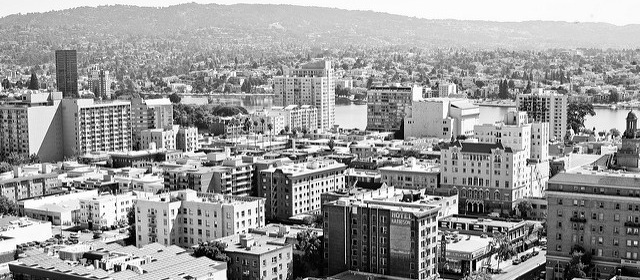
(This piece by Dr. Micah Weinberg originally appeared on March 23, 2016 in the Oakland Tribune.)
The communities of Oakland must start fighting alongside each other rather than against each other to address the housing emergency that is affecting everyone in the Bay Area.
Activists shut down a March 18 Oakland Chamber of Commerce meeting focused on the opportunity to build more housing in the city. The protesters are motivated by real suffering of far too many people whose lives have been upended by eviction and whose livelihoods have been compromised by rising regional poverty levels even in the midst of an economic boom for some.
The targets of their attacks, though, were people who are essential allies in our most critical shared regional task: building more housing for everyone.
It is now definitively established that the primary cause of rising poverty in the state is the cost of housing. Those costs are caused by undersupply, according to groups as diverse as Beacon Economics and the California Legislative Analyst’s Office.
It took us a generation to get into this hole due to disincentives to housing construction such as Proposition 13, which makes most housing a fiscal loser for cities, and the California Environmental Quality Act, which is often perversely used against the precise type of high-density, mixed-income infill developments we need to achieve our urgent climate and community development goals.
An adequate supply of housing cannot be built in a day but will be built faster if we work together and avoid the false and polarizing choice of affordable versus market-rate.
We need both, and building new market-rate housing takes pressure off existing supply that serves residents from a wide range of incomes.
Recent evidence from places like Seattle and across the bay in San Francisco suggests that concerted efforts to speed housing construction of all types are starting to pay off with some softening in rents.
Still, it’s not coming fast enough to help everyone. And unfortunately, many proposed solutions — including most versions of rent control — threaten to worsen the problem of undersupply.
We need thoughtful short-term policies that address the current emergency, particularly for lower-income people, while not stifling new housing now and in the future.
Mayor Libby Schaff and the Oakland City Council have taken some steps in this direction, setting an ambitious goal for housing construction. A proposal to layer on more fees, however, risks turning those goals into empty promises.
More can be done to streamline and reduce the cost of the housing approval process, which adds tens of thousands of dollars to the price of a new unit before a single hammer has even been lifted.
It’s important in all of this to remember that Oakland is not alone. The housing problem is a regional problem that needs regional coordination and regional solutions, with action from all 101 Bay Area cities from the Peninsula to Marin County.
The Bay Area Council Economic Institute last fall issued a Regional Economic Strategy that advanced a variety of innovative policies focused on leveraging the region’s collective strength to meet our housing needs and put pressure on all cities to meet their obligations.
The humorist Will Rogers once said that if you find yourself in a hole, stop digging. For Oakland and the Bay Area, to get out of the hole we’re in we must keep digging … foundations for new housing.
Header image by Thomas Hawk. Welcome to Oakland. Used under Creative Commons License 2.0.